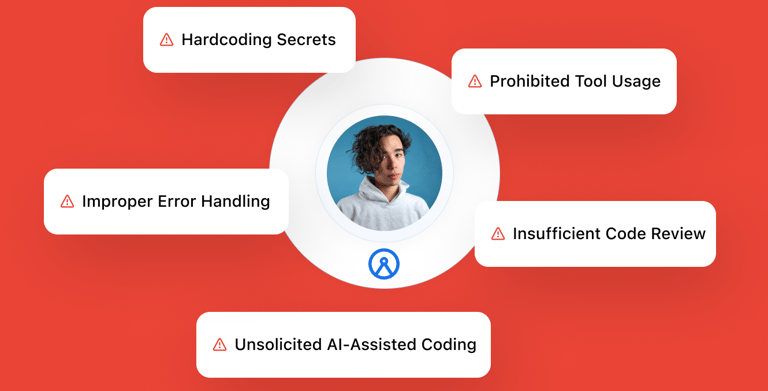Developer Detection & Response refers to the need for security teams to detect, investigate, and respond to risks that originate during software development—where traditional detection signals often lack context.
When vulnerabilities, policy violations, or security events emerge from the SDLC, teams frequently lack visibility into which developer or AI agent acted, what tool was used, and how risk entered the system. This limits attribution, investigation, and effective response.
Developer Security Posture Management (DevSPM) provides the foundation required to address this gap by linking scan results and security findings to developer identity and actions across the SDLC.
By creating a historical record of developer activity—human and AI—DevSPM enables teams to:
Link security findings to the developers and actions behind them
Preserve investigation-ready context across development workflows
Support accurate attribution and faster response when security events originate during development
DevSPM fills a critical gap in ASPM and CNAPP by linking scan results to developer and AI agent identity and actions—providing the context required for downstream detection, investigation, and response workflows.
Most detection and response tools can identify what happened—but not who introduced risk when the origin is development.
When a security issue is detected, teams are often unable to answer:
Which developer or AI agent introduced the risk?
Which action or tool caused it?
Whether this issue is recurring across teams or workflows?
Without developer-aware telemetry, response efforts are reactive, slow, and incomplete.
Developer Security Posture Management provides the missing context required for effective investigation and response.
Several high-profile incidents underscore the necessity of Developer Detection Response (DevDR) to manage risks stemming from developer actions and weak posture management:
Insider Threats and Identity Mismanagement, Uber Breach (2022):
A hacker exploited compromised developer credentials to access critical systems, emphasizing the need for proactive monitoring of developer activity to detect and mitigate insider threats before they escalate.AI Code Vulnerabilities, GitHub Copilot Security Flaw (2024)
Researchers discovered that AI tools like GitHub Copilot can generate insecure code snippets when working with flawed codebases. This highlights the importance of governing AI-driven code development and detecting insecure code patterns in real-time.
Archipelo provides a developer-first approach to securing the Software Development Lifecycle (SDLC), with capabilities that directly address the need for real-time risk detection and actionable insights:
Developer Vulnerability Attribution
Trace CVE scan results to the developers and AI agents who introduced them.Automated Developer & CI/CD Tool Governance
Scan developer and CI/CD tools to verify tool inventory and mitigate shadow IT risks.AI Code Usage & Risk Monitor
Monitor AI code tool usage to ensure secure and responsible software development.Developer Security Posture
Monitor security risks of developer actions by generating insights into individual and team security posture.
By providing these capabilities, Archipelo empowers organizations to protect their SDLC, reduce insider threats, and strengthen software security.
Developer Detection & Response is an outcome enabled by Developer Security Posture Management.
By making developer actions observable—human and AI—organizations can:
Improve investigation accuracy
Reduce response time
Strengthen compliance evidence
Address root cause instead of recurring symptoms
Archipelo strengthens existing ASPM and CNAPP stacks with Developer Security Posture Management—providing the developer-level observability and telemetry required for developer-aware detection and response.
Contact us to learn how Archipelo strengthens your existing ASPM and CNAPP stack with Developer Security Posture Management.


